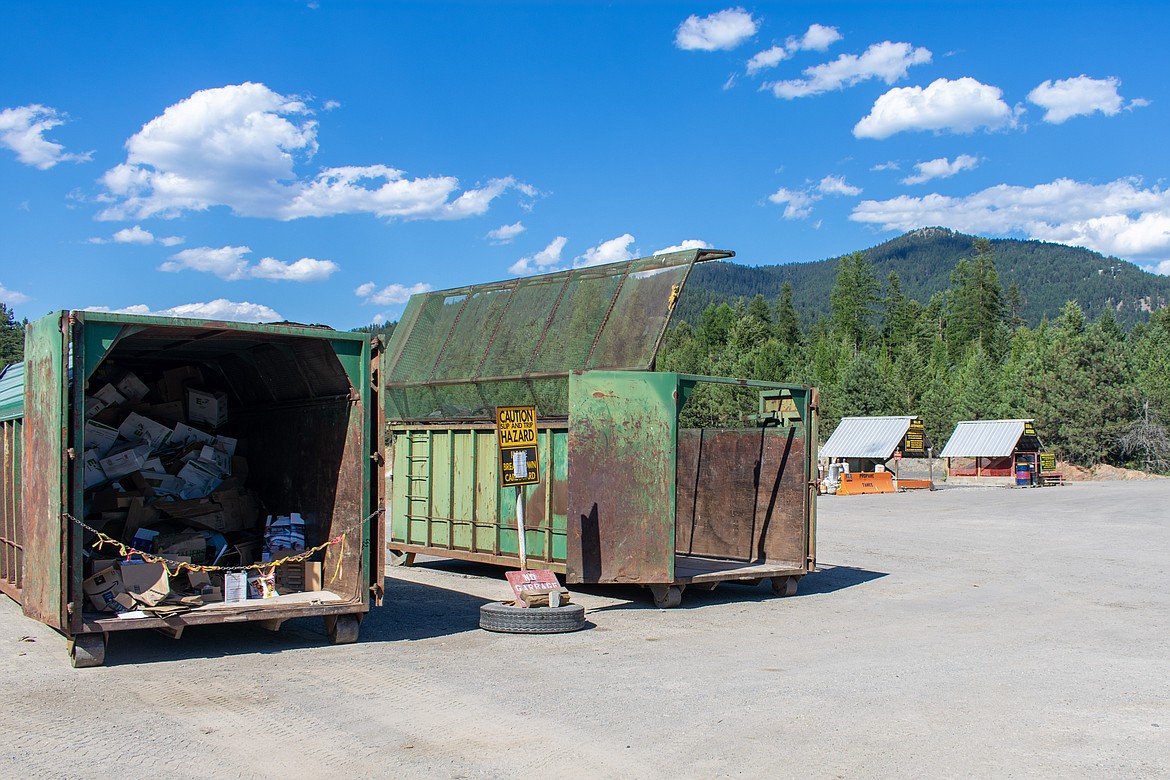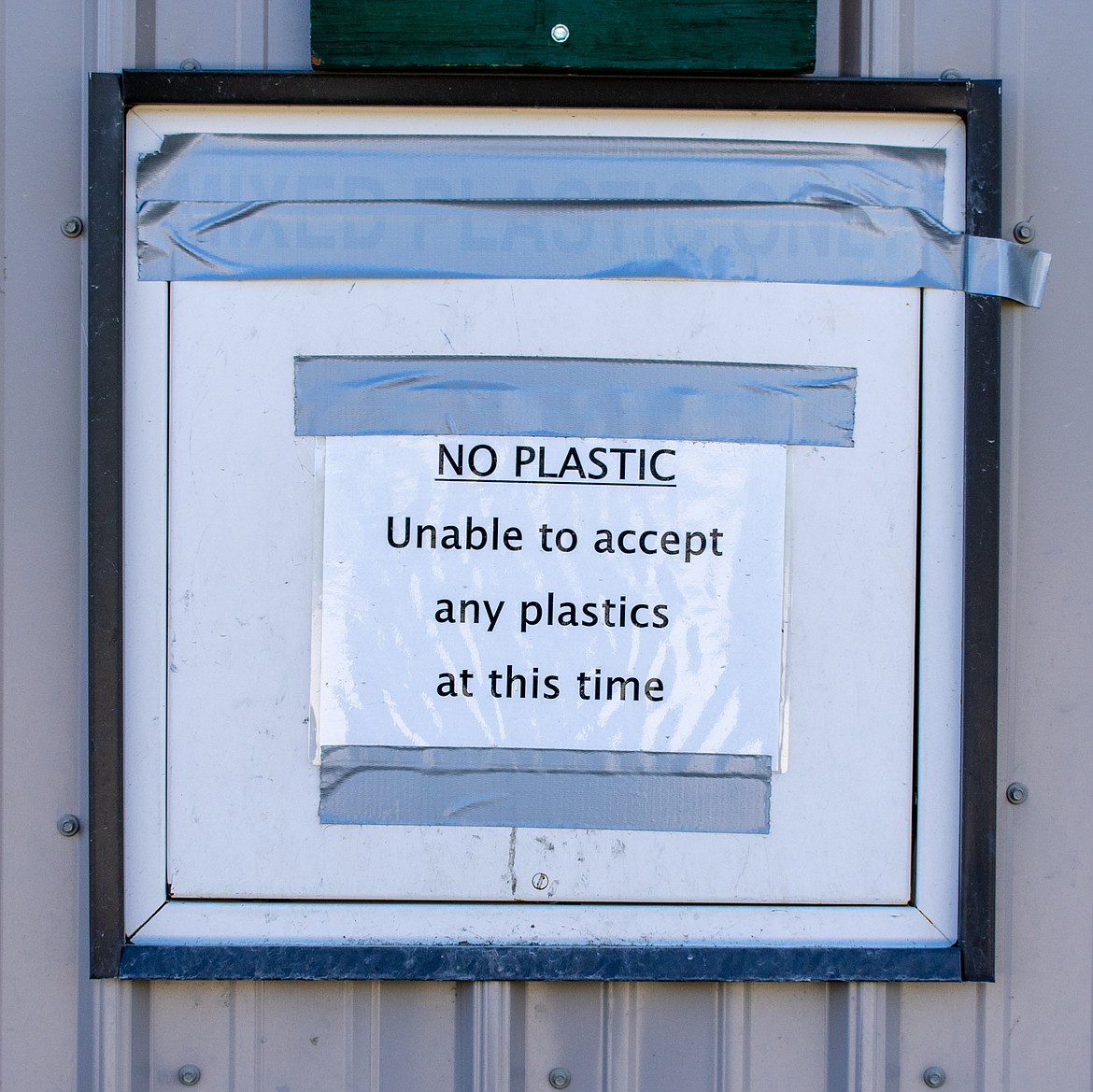Lincoln County Landfill working on 50-year plan
When anything is thrown in the trash in Lincoln County, it never leaves. Every piece of trash is deposited here, in the community’s back yard.
There are landfills for stumps and concrete in Libby, Troy and Eureka, but everything else — from dirty diapers to sofas — ends up in the landfill cell off Pipe Creek Road.
Bryan Alkire, the manager of Lincoln County Solid Waste, said that before he came to work there, he thought of the landfill as essentially a hole that everything goes into.
Now, as he prepares a 50-year plan for waste disposal in Lincoln County, he has a very different outlook on trash and recycling.
Most people probably don’t want to think beyond the moment they take out the trash, or what happens to their waste right here in the county, Alkire said.
But for the workers who deal with it daily, ignoring the accumulation of trash isn’t an option.
Currently, the county’s landfill is no longer a hole in the ground, though it did start as a series of trenches, Alkire said. It is rather a growing hill that will extend another 30 feet toward the sky before it is capped.
Recycling has helped to extend the life of the current cell by keeping things out of the landfill, though Alkire said it’s hard to estimate how much time it has added. Yet, with the current cell expected to be full in only around seven years, Alkire is already planning for the next cell.
The county did seek permission from the Montana Department of Environmental Quality to grandfather in an area at the landfill that had been used previously as a dump and already has trash buried beneath it, he said. But, it does not seem likely that DEQ will grant permission.
When the new cell is created, county residents will have to pay around $1 million for it, with around $20,000 a month just in interest on the loan.
With discussion of developing technologies for waste recovery — such as a Dow Chemical program to convert used plastics into diesel — Alkire said he hopes to see a day when there is no need for landfills.
In the near future though, keeping the far corners of Lincoln County pristine and free of trash means that one part of the county has to be literally packed full of it.
Recycling?
With the Chinese ban on importing plastics to recycle, Lincoln County is among an ever growing number of communities that has to deposit those plastics in limited and expensive landfill space.
But there are still things residents can do to save themselves money in the long run by filling the landfill more slowly.
Alkire estimated that around 25 percent of what Lincoln County throws in the trash could be recycled instead, including cardboard, metal and paper.
Lincoln County lacks the personnel and money even to sort through all of the recycling to separate out items dumped in the wrong bin, Alkire said.
If something goes into the trash that could be recycled, there is nothing to stop it from ending up in the landfill.
It may be cardboard that had a plastic wrapper around it, a pizza box, a cardboard box thrown out after being used to hold trash or simply a discarded can.
Yet, even the smallest piece makes a difference, Alkire said.
“Even one piece of metal or a small box, it all builds up over time in terms of a landfill,” he said.
In addition to the greenbox sites located all around the county, residents can also take recyclables to any of the three landfills in Libby, Troy or Eureka, or to the Happys Inn transfer station.
According to Waste 360, a marketing effort participated in by multiple solid waste and recycling organizations, the Chinese government has been warning of possible restrictions for several years.
A 2016 documentary entitled “Plastic China,” which looked at the lives of people who made their living from recycling imported waste, created an uproar in the country. That seemed to be the tipping point that led to the recent bans and escalating restrictions.
Early this year, the Chinese government completely banned importation of plastic waste and unsorted paper. For everything else, they set a low “contamination” threshold requiring, that recyclables be more thoroughly sorted to pass import inspections.
The 0.5 percent contamination threshold set by China stands in contrast to a 2 to 4 percent contamination rate reported by Waste 360 for the average municipality-produced bale of recyclables.
There is potential for more recycling capacity to develop within the U.S., but that may not be a complete solution either. According to “Plastics recycling: challenges and opportunities” a British paper listed in the U.S. National Library of Medicine from 2009, much of plastic recycling ends in lower grade consumer items that cannot then be recycled again, ultimately ending in a landfill at the end of their lifecycle.
Those processes are also more expensive than making products directly from plastic derived from crude oil, which limits demand.
But, the paper discusses several alternative solutions, including the conversion of plastic back into fuel, and the emergence of biodegradable plastics that can be composted, though those options also have complications, costs and additional requirements.
Local effort
Alkire said he is always looking for new developments and opportunities that will keep waste out of the landfill, including following any progress on U.S. options for recycling plastic.
Due to weight and transport, there is also no current local option for recycling glass, which ends up in the landfill as well.
Of course, not all re-use takes the form most may think of as recycling.
At the Libby landfill, Alkire said that they not only send wood from yard waste through the chipper, but some items such as wood from furniture. That material is mixed with composted pressings from the waste treatment plant, and will eventually form the soil amendment for a seed bed over the landfill cell when it is capped.
Pointing out a line of trees that now grow over an area previously used as a garbage dump, Alkire said it’s hard to say what all will be able to grow on top of the current landfill. But there are any number of uses the space could be converted to in time.
With the growing demand for aggregate to use in new construction, there are other locations in the eastern U.S. where old concrete is being dug out of landfills to be crushed and reused as filler material, Alkire said. It’s possible that the Class IV landfills for stumps and concrete in Libby, Troy and Eureka could be a source for that type of material some day in the future.
Solid Waste has also taken steps to make recycling easier, such as installing a floor in the cardboard bin at the Libby facility that makes it possible to compact cardboard that hasn’t been broken down.
Taking care not to add anything to the trash that doesn’t have to go there is not just a matter of environmental responsibility, but of financial responsibility as well, Alkire said.
“The longer that we can put off a landfill expansion, the better off we are,” he said.
Other recycling opportunities
Lincoln County Solid Waste is currently accepting electronic waste for recycling through Sunday, Aug. 12. Items can be taken to either the Libby facility on Pipe Creek Road from 8 a.m. to 6 p.m. or the Troy facility on Dump Road from 10 a.m. to 6 p.m. The Libby Facility is closed on Sundays. The Troy Facility is closed on Wednesdays and Thursdays.
Prohibited electronic waste:
CRT monitors (computer monitors that are not flatscreens)
Tube and projection TVs, including console TVs
Air conditioners
Alarm clocks and clock radios
Non-rechargeable batteries
Flourescent tubes and all other light bulbs
All other light bulbs
Major appliances and kitchen appliances (cincluding small kitchen appliances)
Microwave ovens
Smoke detectors





